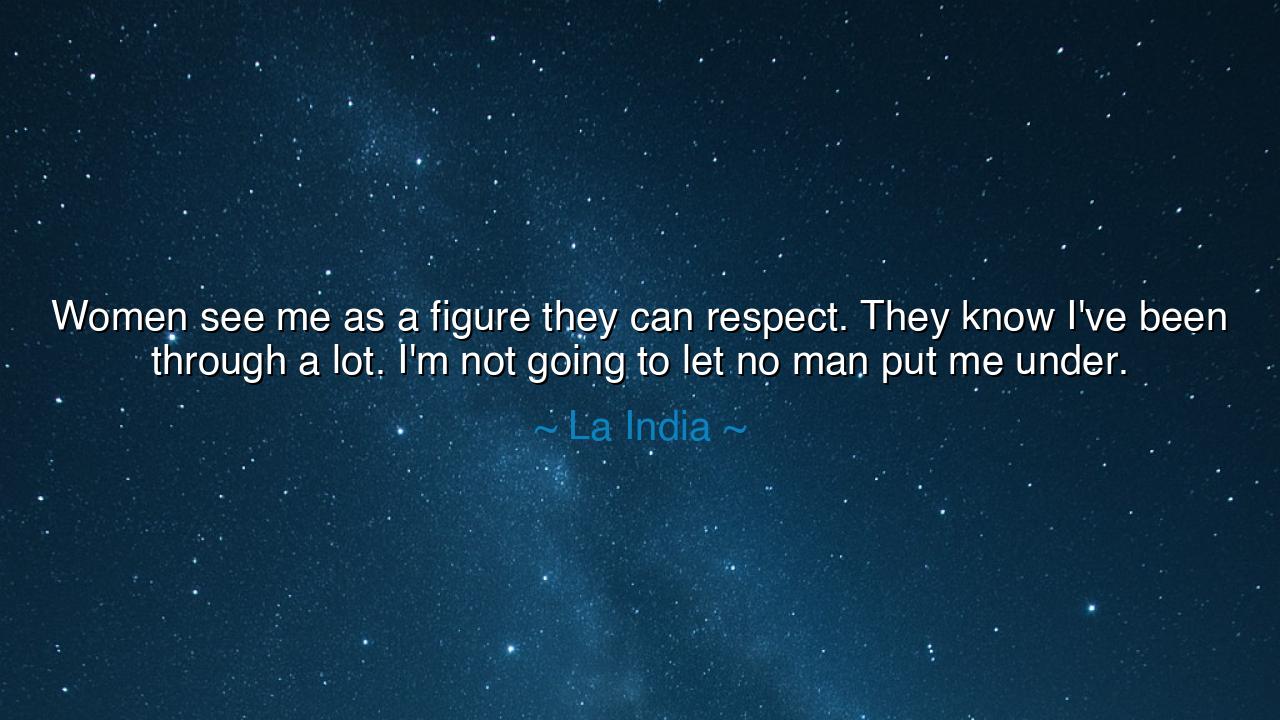
Women see me as a figure they can respect. They know I've been
Women see me as a figure they can respect. They know I've been through a lot. I'm not going to let no man put me under.






The words of La India—“Women see me as a figure they can respect. They know I've been through a lot. I'm not going to let no man put me under.”—resound with the strength of survival and the fire of defiance. In them we hear the voice of one who has walked through trials, endured wounds, and risen from the ashes with unbroken spirit. She speaks not only for herself but for countless women who carry pain within them, yet refuse to be crushed. Her declaration is a hymn of resilience, a vow that dignity will not be surrendered, and that respect is born not from ease but from endurance.
From the beginning of history, women have risen against forces that sought to diminish them. Queens and peasants, prophets and poets—many endured silence, abuse, and oppression, yet from their pain arose power. To be seen as a figure of respect is not to have avoided suffering, but to have faced it and emerged unbowed. La India reminds us that women look to her not because her path was smooth, but because she bore her burdens openly, and in her refusal to be defeated, they find their own courage mirrored back to them.
Consider the story of Harriet Tubman, who escaped the chains of slavery only to return again and again to free others. She was beaten, hunted, and despised by the powerful, yet she declared that no man, no master, no system would put her under. Her life became a beacon, not because she lived without suffering, but because she transformed her suffering into liberation for herself and for others. La India’s words stand in this same tradition, where respect is not demanded but earned in the fires of struggle.
The meaning of her declaration is also deeply personal: “I’ve been through a lot.” These simple words carry the weight of untold battles—heartbreaks, betrayals, trials of poverty, or perhaps violence. Yet instead of cloaking her scars, she reveals them, turning them into testimony. This is the ancient truth: the scarred warrior inspires more than the untouched, for the wounds themselves become symbols of survival. Women respect her not only for her voice in music, but for the voice of her life, which sings of endurance.
There is also fierce defiance in the vow: “I’m not going to let no man put me under.” It is a stand against domination, a refusal to be silenced, broken, or erased. This spirit has been the heartbeat of women who refused to bow to unjust authority, from Joan of Arc leading armies under divine vision, to Malala Yousafzai defying the forces that sought to keep her from education. Their message is the same: dignity is non-negotiable, and no power on earth has the right to diminish the worth of a woman.
The lesson for us is powerful and enduring: respect does not come from perfection, but from resilience. It is born in those who, despite suffering, refuse to surrender their voice or their dignity. To honor yourself is to declare that no one can define your worth or break your spirit. In living this truth, you not only free yourself but become a light to others, showing them that they, too, can rise.
Practical action is clear: embrace your story, even the painful chapters, and do not let them be used against you. Stand firm in your dignity when others seek to diminish it. Offer respect to those who have endured, for their scars are not signs of weakness but of survival. And if you see others weighed down, remind them of their strength, so that they may rise as La India rose, unbroken and unafraid.
So let her words be remembered as a battle-cry: respect is forged in resilience, and no force, no man, no circumstance can put under the one who has chosen to rise. Women who carry this fire become more than individuals—they become symbols, reminders that the human spirit, when guarded by dignity, can endure anything. And in their endurance, they teach generations to come how to stand unshaken.






AAdministratorAdministrator
Welcome, honored guests. Please leave a comment, we will respond soon